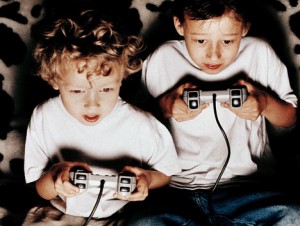 It’s January, the month when children across the country spend hours in front of the television playing with the millions of video game counsels sold over the holidays. In fact, you probably personally know a “gamer” yourself. According to the Entertainment Software Association, more than 68 percent of American households play computer or video games.
It’s January, the month when children across the country spend hours in front of the television playing with the millions of video game counsels sold over the holidays. In fact, you probably personally know a “gamer” yourself. According to the Entertainment Software Association, more than 68 percent of American households play computer or video games.
We hear often about studies demonstrating that too much screen-time – whether television, video games or computers – is associated with attention problems in children. But it turns out there are some benefits to playing video games, too.
A cadre of researchers in cognitive sciences, psychology and neuroscience are building a body of evidence that shows video gaming (in moderation, of course) helps improve attention, vision, multitasking and other cognitive skills.
A systematic review by researchers at the University of Rochester’s Department of Brain and Cognitive Sciences found that playing action video games significantly reduces reaction times without sacrificing accuracy across a variety of real-world tasks, including looking for a letter in a field of other letters and indicating the direction of an arrow while ignoring arrows pointing in the other direction.
Another study found that video games help improve contrast sensitivity, or the ability to see subtle shades of gray.
“And this is a skill that comes in very handy if you’re driving in fog,” explained Daphene Bavelier, a cognitive researcher at the University of Rochester, who spoke to reporters from National Public Radio for a recent story. “Seeing the car ahead of you is determined by your contrast sensitivity. We looked at the effect of playing action games on this visual skill of contrast sensitivity, and we’ve seen effects that last up to two years.”
Lauren Sergio from York University in Toronto used functional brain scans to find that skilled gamers mainly an area of the brain specialized for planning, attention and multitasking, meaning that they don’t activate as much of their brain to do complex tasks with their hands. Non-gamers, in contrast, predominately use an area called the parietal cortex, the part of the brain specializing in visual spatial functions.
“The non-gamers had to think a lot more and use a lot more of the workhorse parts of their brains for eye-hand coordination,” she says. “Whereas the gamers really didn’t have to use that much brain at all, and they just used these higher cognitive centers to do it.”
In fact, employers including hospitals, the U.S. armed services and many police departments are using video games to help doctors, soldiers and police officers work on skills they use in their jobs everyday.
The bottom line: video games, played in moderation, actually help kids develop some important life skills. Just make sure to set a timer, or find another way to limit screen-time.



this is cool info